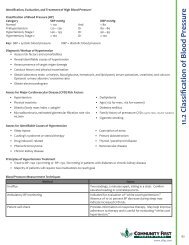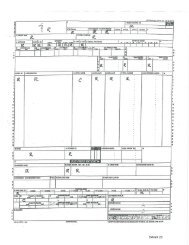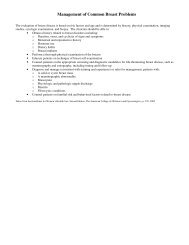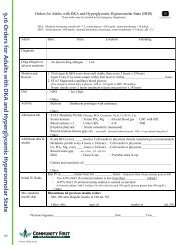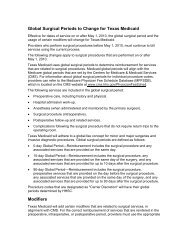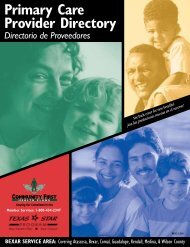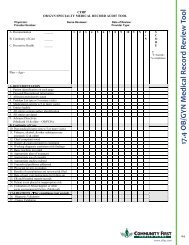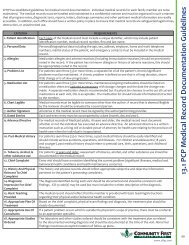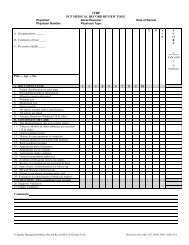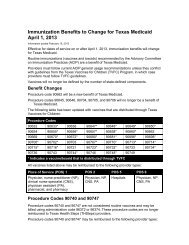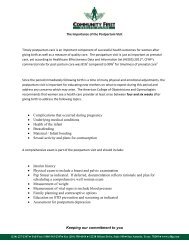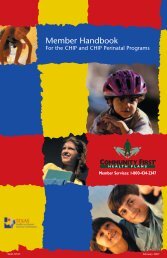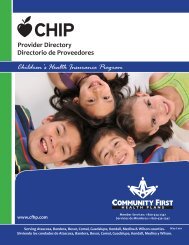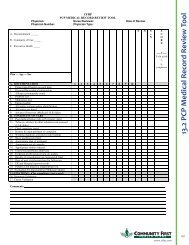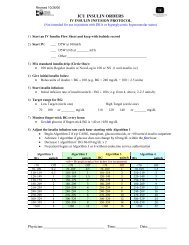Full Clinical Guidelines - Community First Health Plans.
Full Clinical Guidelines - Community First Health Plans.
Full Clinical Guidelines - Community First Health Plans.
Create successful ePaper yourself
Turn your PDF publications into a flip-book with our unique Google optimized e-Paper software.
CHILDREN’S SERVICES HANDBOOK<br />
CH.47<br />
Mental <strong>Health</strong> Interview Tool/Referral Form (Ages 3–9 Years)<br />
Mental <strong>Health</strong> Interview Tool/Referral Form (Ages 3–9 Years)<br />
Mental <strong>Health</strong> Interview Tool/Referral Form<br />
Ages 3 to 9<br />
Child’s Name: ____________________________<br />
Birth Date: _______________________________<br />
Date: _____________________________________<br />
For this age group you will obtain information from the parent/caregiver and from your own observations of the child’s behavior. If possible,<br />
interview the parent alone when asking questions about sexual or physical abuse. Circle items of concern. * The presence of any of these<br />
symptoms or behaviors may signal that the child is in crisis, and efforts should be made to secure prompt evaluation.<br />
Feelings:<br />
Behavior:<br />
Does your child display feelings that concern you or seem out of<br />
the ordinary for age?<br />
Does your child frequently display behavior that seems out of the<br />
ordinary for age?<br />
❏ Restless ❏ Problems in school<br />
❏ Sad or cries easily ❏ * Harms other children or animals<br />
❏ Excessively guilty ❏ Lacks interest in things s/he used to enjoy<br />
❏ Lack of remorse ❏ Engages in sexual play with others, toys, animals<br />
❏ Irritable, angers or temper tantrums easily ❏ * Destroys possessions or other property<br />
❏ Sullen ❏ Steals<br />
❏ Fearful or anxious ❏ Refuses to talk<br />
❏ * Sets fires<br />
❏ Overactive<br />
❏ * Self-destructive<br />
❏ * Has been in trouble with the police (older child)<br />
Social Interaction:<br />
Thinking:<br />
Do you have concerns about how child gets along with you, other Have you noticed any of the following to be a problem for your child?<br />
family members, playmates, other adults?<br />
❏ Withdraws including no eye contact ❏ * Frequently confused<br />
❏ Clings excessively ❏ Daydreams excessively<br />
❏ Difficulty making and keeping friends ❏ Distracted, doesn’t pay attention<br />
❏ Defiant, a discipline problem ❏ * Bizarre thoughts<br />
❏ Severe or frequent tantrums ❏ Mistrustful<br />
❏ Aggressive ❏ * Sees or hears things that are not there (excluding<br />
imaginary friends in younger children)<br />
❏ Argues excessively ❏ Blames others for his/her misdeeds or thoughts<br />
❏ Refuses to go to school ❏ * Talks about death<br />
❏ Prefers to be alone ❏ * Frequent memory loss<br />
❏ Schoolwork is slipping (grades going down)<br />
Physical Problems:<br />
Do you have any concerns about the following physical signs?<br />
Has this been evaluated?<br />
❏ Daytime wetting<br />
❏ Soils pants<br />
❏ Refusal to eat<br />
❏ Headaches<br />
❏ Excessive weight loss or gain<br />
❏ Sleep problems, nightmares, sleep-walking, early<br />
waking<br />
❏ Vomits frequently<br />
❏ Frequent stomachaches<br />
❏ Lacks energy<br />
Comments:<br />
Other:<br />
Is this child accident-prone?<br />
Are there any situations that are causing your family particular<br />
stress?<br />
Has this child or his/her parents been subject to neglect, physical,<br />
sexual or emotional abuse? If yes, what type, when, treatment, etc.<br />
* Is this child at risk for out-of-home placement because of behavior<br />
problems?<br />
Signature/Title: _____________________________________________________________________________<br />
120 H EALTH PLANS<br />
www.cfhp.com<br />
CH-315<br />
CPT ONLY - COPYRIGHT 2010 AMERICAN MEDICAL ASSOCIATION. ALL RIGHTS RESERVED.



